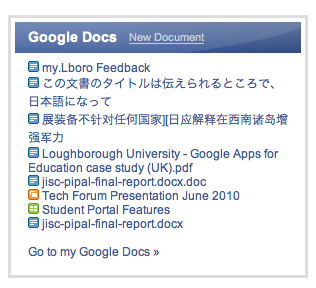Hanging Out with Google+
What’s this? Google+ is Google’s new approach to social networking. It builds on top of many other Google services, and Google intend for it to become a key feature of most of their products.
Why am I writing about it here on the E-Learning Blog? Well, Google+ has a number of features that may be interesting for educational institutions. I introduced a few of these in a recent UCISA presentation with Google’s William Florance. We recorded the session, and a copy of this is embedded below:
Read on to find out more about Google+ and its potential in Teaching and Learning…
This whole presentation was in itself quite a good a demo of what Google+ is capable of – we created a videoconference (Google+ calls these “Hangouts”), with William connecting in from San Francisco, and shared the slideshow of our presentation. Hangouts are about online collaboration more than video conferencing per se – for example, William was able to edit our slides online while we were presenting. That said, Hangouts is a very good implementation of web conferencing, e.g. we were able to have a natural conversation without needing a headset/microphone thanks to Google’s advanced audio codec.
The slides for our talk were created using a related product called Google Docs, which lets people collaborate online to edit documents, drawings, online forms/surveys and spreadsheets. I think Google Docs has a lot of potential in the Teaching and Learning context, and will blog about it separately in its own right.
You can view a native copy of our slides for the UCISA talk in Google Docs:
So, what relevance does Google+ have for us in Higher Education?
In the slides I list some examples of potential applications, including:
- Online tutorial groups, part time and distance learners
- Inter-institutional research and teaching collaborations, such as the
Midlands Energy Graduate School - Engagement with prospective and pre-sessional students, alumni etc
- Student clubs and societies
- Promoting your “brand” (be that your department or institution, or just yourself!)
- Platform neutral remote IT support – you can share your desktop or individual applications from within Google+
Moreover, Google+ and Google’s other key collaboration tools such as Google Docs are provided to educational institutions free of charge. This is quite a stark contrast with commercial software packages and services which typically cost tens of thousands of pounds per annum. Indeed Google+ Hangouts alone is rapidly approaching the functionality of the typical institutional web conferencing systems such as Blackboard Collaborate and Adobe Connect, and the product is inherently designed around the sort of large scale sharing and collaboration that institutional systems (and licensing!) typically struggle with.
However, there are a few wrinkles with Google+ that mean we cannot simply discontinue our Blackboard license just yet. For example, it’s not yet possible to natively record a Hangout, although Google are trialling this feature at present (as “Hangouts On Air”). Consequently for the moment recordings must be made and edited with a separate application such as Camtasia or Echo360 Personal Capture. It should also be noted that Google+ isn’t yet covered by Google’s support contract and Service Level Agreement, although I expect that this will change fairly soon.
I think Google+ has reached the tipping point (both in terms of features and critical mass), and is well worth a look if you have an interest in any of the areas I’ve listed above. Learning Technologists, IT support staff and E-Learning “Champions” at institutions which have migrated staff and/or students to Google will find it particularly worthwhile to familiarize themselves with Google+. I’ve mainly talked about the Hangouts feature in this blog post, but there is a wealth of other stuff out there which we touch upon in the UCISA presentation.
What next for Loughborough?
At Loughborough we have had a very successful Google Apps service for students and alumni since Christmas 2009, with huge levels of interest in the online calendar and Google Docs for collaboration. We have been trialling Google’s tools with a few staff groups, and will be aiming to gather feedback more widely over the next few months on whether it would be appropriate to “Go Google” for staff as well.
For members of Loughborough University we have provided a quick route into Google+ and Google Docs via my.Lboro, the new Loughborough University portal site. To try these services out, visit my.Lboro and log in with your University credentials – you can then click on the Google+ link to try out Google+:

…or click on the “New Document” link to create your first Google Docs document:

(If you also have a personal Gmail account you may need to log out of this or use Google’s “Switch Account” feature to switch to your Loughborough University institutional account)
We’re very interested in hearing about people’s experiences with these tools, so please do leave a comment if you have any feedback on Hangouts, Google+ or the Google online collaboration tools more generally.